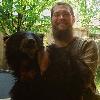Re: Why doesn't society recognize the good we do?
There's a lot of interest in hunting by non-hunters. My wife's friends will often comment to her "I wish my husband hunted". They're jealous of the fantastic meat we eat. True vitriolic anti-hunters are fairly rare, but very vociferous.
I do think, however, the trend away from hunting in North American society has been driven by two main factors; the urbanization of people, and the popular media's left-wing anti-hunting agenda.
I was raised on a farm. We raised livestock. We slaughtered livestock to eat. Therefore, at an early age I understood how death is required to eat meat. I also learned respect. I remember one morning when I was six or seven, I was poking at the eye of a still-born calf. My father saw me do it, and scolded me, and told me it was disrespectful to the calf, even though it was dead. I learned a important lesson there too. Urban-raised kids are simply disconnected from their food. Even many vegetarians probably have no concept of the displacement of wildlife required to grow their food.
The second reason, the media is the most vexing. In simple terms, we have been "Disneyfied" . The media promotes an idea of animals having all of the traits, emotions and even language of humans. In movies, especially kids cartoons, hunters are either portrayed as evil or as fools. It's a big problem, and we need to have the courage to address it.
I won't always be young, but I can be immature forever



 Reply With Quote
Reply With Quote





